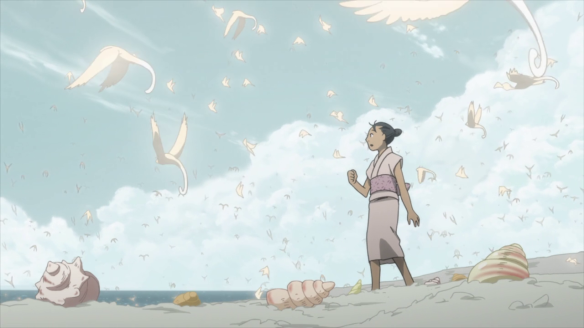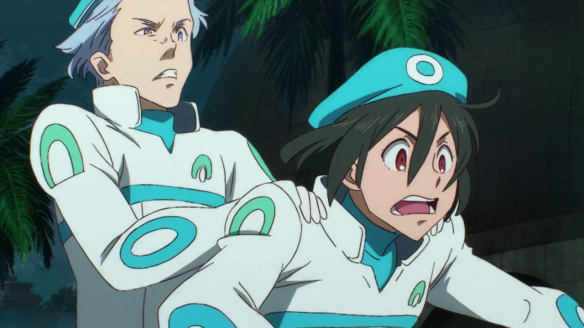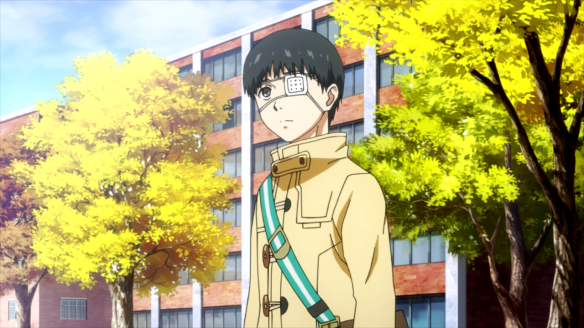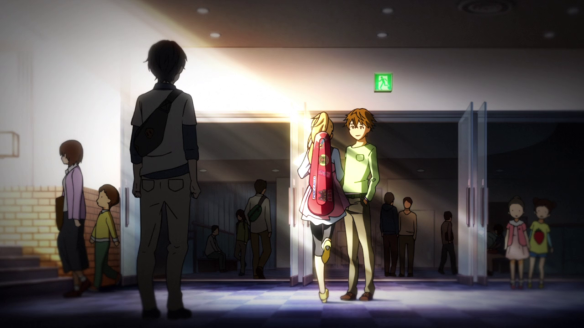Time to kick off this tournament with its most lopsided matchup in Mushishi Zoku Shou (#1) vs. Gundam: Reconguista in G (#32). Spoiler alert: Mushishi wins.
Mushishi Zoku Shou – Episode 2
While this episode didn’t match the sublime heights achieved by the premiere, it did feature the most beautifully animated scene of the tournament thus far. The birdlike creatures in the screenshot above are actually a type of mushi whose appearance on land signals impending disaster at sea. Listen too closely to the songs they sing from within their seashell homes, and you may lose your ability to speak. Mina, a young girl from the fishing village where this episode takes place, falls victim to that fate, but learns to speak again after her father allows her to converse with the other girls in the village (more on that in a bit). What makes this scene work so well is not just how gorgeous it is visually, but how the mushi’s flight represents Mina’s freedom – freedom from the life of isolation her father had required her to live, and freedom from the muteness brought on by the Yadokaridori’s song. Here’s a link to a (rather large) .gif of the scene in question. Even apart from the rest of the story, it’s marvelous to look at.
Ten years before the events of this episode, Mina’s mother was killed by a shark while diving on the village elder’s boat. The elder chose to pull his own wife from the sea first, leaving him with no time to rescue the other woman from her death. Mina’s father Sakichi, made bitter by his loss, isolated himself from the rest of the village and forbade his daughter from talking to any of the shore folk. We see both fathers deal with their daughters very differently here – the elder is gentle and reassuring, while Sakichi is stern and unforgiving. We even see the elder, still carrying the weight of his decision ten years later, plead with Sakichi to return to the village. Despite our understanding of his grief, we know that Mina’s father is in the wrong. But when the village’s fish farms are ruined by the red tide (which was foreshadowed by the presence of the Yadokaridori), Sakichi presents the elder with a valuable pearl he’d been hoarding, knowing that it’s the village’s only chance at survival. In exchange, he asks that he and his daughter be allowed to return to the village. The elder, overcome with emotion, accepts both the pearl and his old friend’s request through his tears.
Plot synopsis isn’t really my thing, so why do I find it so appropriate when it comes to writing about Mushishi? I think it’s to demonstrate how perfectly all the moving pieces come together to create each episode. The Yadokaridori are confined to their seashells at first, just as Mina is forbidden from talking to the villagers, but they both achieve freedom by the episode’s end. The red tide functions not only as a plot point that puts the village in peril, but also as a visual reminder of the death of Mina’s mother, and it forces Sakichi to confront and truly accept the fact of his wife’s passing. And Ginko’s advice that Mina hear more voices than just her father’s offers a compelling reason for them to return to the village, so we know that Sakichi’s decision came not only from his own personal growth, but also his love for his daughter. In fact, in writing this paragraph, I may have convinced myself that this episode is at least as strong as last week’s. That’s the remarkable thing about Mushishi – it maintains for entire seasons a level of quality that few other shows can reach even once.
Gundam: Reconguista in G – Episode 2
Despite the harsh words I had for it last week, there are some things I like about this series. Its old school character models, animation, and music all have a certain charm to them. And although this is the first time I’ve watched a Gundam show from the beginning, I can understand the appeal of watching giant robots punch and shoot each other. But where this show fails again this week is in its nonsensical plotting and dialogue. I’ll provide one example of each, though really about 50% of the episode could serve as a “what not to do” guide for screenwriting.
Plot: The Capital Army has taken captive a space pirate named Aida, and hidden away her highly advanced mobile suit so that neither she nor her fellow pirates can reclaim it. Bellri Zenam is the only member of the Capital Army capable of piloting that mobile suit, referred to as the G-Self. Bellri is also smitten with Aida, and rescues her from prison with the help of his friends despite his country being at war with the pirates. None of his friends seem to have a problem with this, except for the pink-haired girl who’s obviously sweet on Bellri, and keeps barking instructions such as, “Don’t stick your butt out!” and “Don’t get distracted by some girl!” Bellri’s commanding officer then drops by and demands that he man the G-Self and fight against the attacking pirates, and of course he takes Aida with him, who as the G-Self’s former pilot has more reason than anyone to prevent him from carrying out his mission. But again, nobody has a problem with this, not even the officer who saw her clear as day as he was giving Bellri his orders. It’s not until Aida is physically attempting to enter the cockpit of the G-Self that this moron gives the order to “kick her off,” presumably to her death, as she was thirty feet off the ground at that point. None of this makes any sense.
Dialogue: As Bellri is rescuing Aida from captivity, he asks why someone like her is a space pirate. She responds, “We ought to be coating the Earth in solar panels, but the Capital prohibits it. That’s dictatorial!” Bellri begins to respond, “Because Earth-” and then the scene cuts to three seconds of the conflict going on outside, before returning in time to catch, “-is why!” Then Aida slaps him. This was truly the most baffling scene of the tournament thus far. Why was it necessary to cut to the exterior shot, preventing us from hearing Bellri’s retort? Without hearing what exactly he said to offend her, the slap that follows is laughable. Unless this is some kind of commentary on the futility of anti-solar-panel sentiment (and if it is, it’s likely the worst in recorded human history), this scene also makes no sense.
The Verdict: Mushishi threads its plot points together with the elegance of a master tailor, while Gundam is an incomprehensible mess of an anime. Mushishi wins and it isn’t even close.
Now let’s see who won this week’s feature match between Tokyo Ghoul (#16) and Your Lie in April (#17), or, if you prefer, Shigatsu wa Kimi no Uso. Both of these series had solid premieres but didn’t manage to pull me in for the long haul. Whichever one does a better job of selling itself and its premise will be the victor here.
The shows that are neither very good nor very bad are always the hardest to write about. Tokyo Ghoul’s second episode picked up just seconds after its first left off, and like that first episode, it was concerned mostly with table setting. It was expected that Kaneki wouldn’t accept his half-breed status or master his hunger until the end of this episode at the earliest, but those concepts weren’t explored in any meaningful way, just resolved after a lot of shouting, choking, punching and crying. The scenes featuring Rize, who serves as a manifestation of Kaneki’s ghoul self, were ripped straight from probably hundreds of supernatural series before this one. The big fight scene’s inverted color palette made the characters gray (less visually interesting) and the blood neon blue (less impactful than red), so unless this was done to satisfy the Japanese equivalent of the F.C.C., it was merely a poor creative choice.
I was already tired of Kaneki’s “I want flesh/I don’t want flesh” shtick by the second time it recurred, so if that pops up even once next week, my laptop will be at risk of being thrown across the room during episode 3. The closing dialogue between two mysterious ghoul hunters promises the same bigger mythology as the premiere, so hopefully this series will incorporate some of that into its weekly proceedings, and stat.
Wow. How amazing was Kaori’s performance of Beethoven’s Violin Sonata No. 9? The scenes of the competitors before her all featured lovely music, but were accompanied by static images, so I was worried that A-1 Pictures had blown their blown on that beautiful first episode, but boy was I wrong. Kaori came to life in stunning animation as she played and brought the music with her, turning in a powerful version of Beethoven’s piece apparently of her own composition. This earned her the scorn of the head judge, the adoration of the attendees (enough to earn her the audience choice award and send her to the next round of the competition), and the love of Kousei, who decided immediately after her performance that she was beautiful.
Kousei has no game with the ladies, however, and Kaori is already set on Watari, the middle school Lothario who is nonetheless a good friend to Kousei and advises him to act on his attraction. But the bond between the two leads is already quite strong, even if they don’t know it yet; beyond a love for classical music, they share a fragility and a sensitivity to how their performances are perceived. Kousei had the classic taskmaster mom who drove it into his skull that if you didn’t place first, your efforts were in vain. We don’t know the reason for Kaori’s self-doubt just yet, but despite her claims not to care about the results of the competition, her hands were trembling when she asked Kousei what he thought of her performance. Despite the age of these two student musicians, there’s potential here for a romance based on something beyond fourteen year old hormones.
Shigatsu takes a step toward delivering on that promise before the episode even ends, when Kousei encounters Kaori on his way home from school. She’s waiting for Watari, who’s planning to skip soccer practice to hang out with her, but he’s running late. So when she asks Kousei if he knows what’s taking so long, he lies and says Watari got held up at practice. Kaori is disappointed, but invites Kousei to hang out with her instead. What Kousei did was sneaky for sure, but it establishes him as a character with some guts, who won’t just pout in the corner until his crush notices that he’s been here all this time. These are good signs from a series that I was on the fence about at first.
The Verdict: Tokyo Ghoul offered more of the same in its second episode, but Shigatsu distinguished itself with a great musical set piece and stronger lead characters. Your Lie in April wins the match, and the honor of going up against Mushishi in the next round.
NEXT UP: Stardust Crusaders vs. Sabagebu!, Aldnoah.Zero vs. Ace of Diamond




